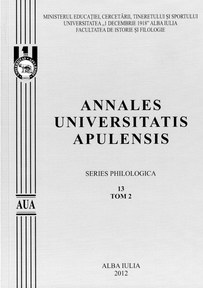On the Power of Silence over Words
On the Power of Silence over Words
Author(s): Mona ArhireSubject(s): Language and Literature Studies
Published by: Universitatea »1 Decembrie 1918« Alba Iulia
Keywords: silence; compressed language; ellipsis; non-verbal stylistic devices; expressiveness; suggestiveness
Summary/Abstract: The paper deals with a seemingly paradoxical quality of the poetic language, namely the one consisting in the reduction of lexical items in favour of enhanced expressiveness. For it is not the amount of words that matter in as far as the poetic richness is concerned, but rather the skilled and original selection thereof. The perspective on the reductive way of expression is a diachronic one, offering insight into the history of the so-called minus procedures throughout the history of world literature, starting from the antique age and continuing up to the modern literary world. Silence, as key-word is extensively presented with a view to offering the perspective of its richness and power over words, which are seen as limited. Contrary to expectation, an absence in the poetic discourse makes up for the scarcity of words and is able to express the ineffable. Beside its strength to offer multiple semantic options to a given message, silence embeds a consistent load of mystery and emotional content, also fostering the artistic and esthetic virtues of a text. Silence has been classified according to the various hypostases that this lacuna (here with positive meaning) can take. The explanation for both the creators’ and the literary critics’ concern for silence can be found in that it “sometimes becomes the most precious element of language” (my transl.) (Blaga 2001: 294). Moreover, as compared to words, which prove limited and ephemeral, possibly leading to banality, silence is infinite and always new, thus superior to the words themselves. A variety of silence types has been identified, ranging from the empty, redundant silence to the paradoxical silence that ‘yells’. The species of silence are probably more numerous than the ones of rhetoric, embedding emotional and semantic wealth. The scholarly work has called instances of communication that comprise figures of speech entailing reduction, including silence, by several names: concise, condensed, dense, rich, compressed, or concentrated language, which was looked at throughout the language registers and styles. However, it is the poetic language where reduction is beneficial, as compared to other genres using more common language and being negatively affected by the ambiguity that condensed language generates. Compression in informative or prescriptive discourse types stem from the implication of the economy of speech principle. This may be beneficial when it confers to messages accuracy, concision and clarity.
Journal: Annales Universitatis Apulensis. Series Philologica
- Issue Year: 13/2012
- Issue No: 2
- Page Range: 419-426
- Page Count: 8
- Language: English

